A year after the United States pulled out of the Iran nuclear agreement, the pact is at severe risk of collapse and the European Union is caught in the middle, struggling to keep supply lines open to the Islamic Republic's wilting economy under the threat of U.S. sanctions.
With few real options left, their trust in the Trump administration running low, and fears rising that conflict could break out, major powers Germany, France and Britain have been reduced to repeating calls for restraint as pressure builds and Iran threatens to walk away from the painstakingly drafted 2015 deal.
"We have to do everything to solve the conflict situation with Iran in a peaceful manner," German Chancellor Angela Merkel said Tuesday. "We will do everything to impress on all sides, but especially to make clear to Iran, that this serious situation mustn't be aggravated."
The pact, which ensures that Tehran's nuclear program be restricted to civilian uses in exchange for economic assistance, was signed by Iran, the U.S., Russia, China, France Germany and Britain. President Donald Trump pulled Washington out of the deal in May 2018.
"We are relying on Iran continuing to abide by it," Merkel said. "If that isn't the case, that will of course have consequences."
But her tougher tone does little to hide the fact that there's not a lot that Europe can do.
Under pressure from U.S. sanctions once held in check by the deal, the value of Iran's currency has plummeted by about 60% in the last year. Inflation is up 37% and the cost of food and medicine has soared 40% to 60%, according to EU figures.
The Europeans believe the growing economic pressure on President Hassan Rouhani may well have prompted Iran's announcement that it will exceed the uranium stockpile limit set by deal in the next 10 days — a time frame that seems unlikely but which cannot be excluded.
In an effort to keep Iran's economy afloat and uphold an agreement they believe has stopped Iran from developing a nuclear weapon, the Europeans have set up a complicated barter-type system to skirt direct financial transactions with Iran and thus evade possible U.S. sanctions.
The workaround, dubbed INSTEX, would help ensure trade between Iran and Europe by allowing buyers and sellers to exchange money without relying on the usual cross-border financial transactions. It is not yet operational, although the EU promises that it will be "soon."
The EU has also introduced a "blocking statute" to protect European companies from the effects of U.S. sanctions, but many international corporations do more business in the United States than in Iran and have already severed ties with Tehran rather than risk running afoul of Washington.
The real problem, though, is oil. Iran's economy is not diversified and oil makes up about 80% of its exports. The country was selling 1 million to 1.5 million barrels a day a year ago, and is only selling 600,000-700,000 now, according to EU estimates.
But EU member states use little Iranian oil. China, another signatory to the nuclear deal, India and perhaps Turkey could buy more, so the Europeans are using diplomatic channels to encourage them to do so.
It's difficult to see what more can be done. The EU provides funds to Iran's agricultural sector and for environmental protection. The country benefits from the European research budget and students have access to EU programs. Beyond that, the 28 nations have donated substantial earthquake relief.
Even as the rhetoric from Iran has risen, no specific new request has been made of the Europeans, apart from a general demand to help keep the economy afloat.
Nor has there been any help from across the Atlantic.
In withdrawing the U.S. from the deal, Trump said it does nothing to stop Iran from developing missiles or creating problems in the Gulf region and Middle East.
Last month, the U.S. ended waivers that allowed some countries to continue buying Iranian oil and deployed the USS Abraham Lincoln aircraft carrier battle group to the Gulf. It also sent four nuclear-capable B-52 bombers to Qatar and deployed more Patriot air defense systems. After two oil tankers were damaged last week in the Strait of Hormuz in what the U.S. said was an attack it blamed on Iran, concern rose that a conflict could break out.
Under pressure from Washington and Tehran, European confidence in both sides appears to be low.
"We base our assessments and our judgments on facts, on the verification mechanisms that are in place and that we trust," EU foreign policy chief Federica Mogherini said Monday, referring to monitoring of the accord by the U.N. nuclear watchdog, the International Atomic Energy Agency. The IAEA has found Iran to be complying with the deal, as recently as May.
The question remains: What more can be done to keep Iran onboard as it sets new deadlines and Washington shows little sign of backing down?
"It is not an easy exercise," said Mogherini, who was due to hold talks in Washington on Tuesday with Secretary of State Mike Pompeo. "During the last year, it has become increasingly difficult for all to keep the nuclear deal fully implemented."
Associated Press writer Frank Jordans in Berlin contributed.
PARIS (AP) — French President Emmanuel Macron warned Thursday that Europe could die if it fails to build its own robust defense as Russia’s war in Ukraine rages on, or if it fails to undertake massive trade and economic reforms to compete with China and the U.S.
Macron urged Europeans to become more ambitious in a fast-changing world to face the challenges of war, fierce trade competition, energy scarcity, climate change and increasing authoritarianism.
In a nearly two-hour speech at the Paris’s Sorbonne University, Macron said the Continent is divided and “too slow and lacks ambition” at a time when the 27-member European Union needs to become a superpower, defend its own borders and speak with one voice if it wants to survive and thrive.
“Our Europe today is mortal,” Macron said. “It can die and that depends solely on our choices,” he added. He called on people to make those choices now because, “it’s today that Europe is between war and peace.”
Russia's aggression in Ukraine, now in its third year, is an existential threat and Europe is not armed enough to defend itself when “confronted by a power like Russia that has no inhibitions, no limits,” Macron said.
‘Our ability to ensure our security is at stake," Macron said. “Russia mustn’t be allowed to win.”
France has been an firm supporter of Ukraine in its fight against Russian aggression, and Macron has often clashed with other Western leaders as he has insisted that Europe must stand by the country at any cost. Last month, the French president alarmed European leaders by saying that sending Western troops into Ukraine to shore up its defenses shouldn’t be ruled out.
Referring to trade practices of China and the U.S., Macron said “the two world powers have decided not to respect the rules of global trade” by shoring up protections and subsides while Europe’s industry remains open and is stuck in overregulation.
“Let’s do the same, we are in competition,” Macron said.
Thursday's speech comes ahead of pivotal European Parliament elections.
Macron, a avid advocate of a united and assertive Europe, also rallied support for his centrist Renaissance party ahead of the June 6-9 vote as far-right parties lead the moderate coalitions in the polls. He called for safeguarding the democratic values as the “authoritarian model” that he said was become “more popular” across the Continent.
The French president lost his majority in France’s most influential house of parliament, the National Assembly, after the 2022 election to the far-left coalition and the far-right National Rally party.
The social situation in France remains tense as Paris prepares to host the Olympic Games this summer, amid protests from teachers, police officers, and farmers in recent weeks. The protests follow huge demonstrations last year against Macron’s ultimately successful proposal to rise the retirement age.
Surk reported from Nice, France. AP correspondent Lorne Cook in Brussels contributed.
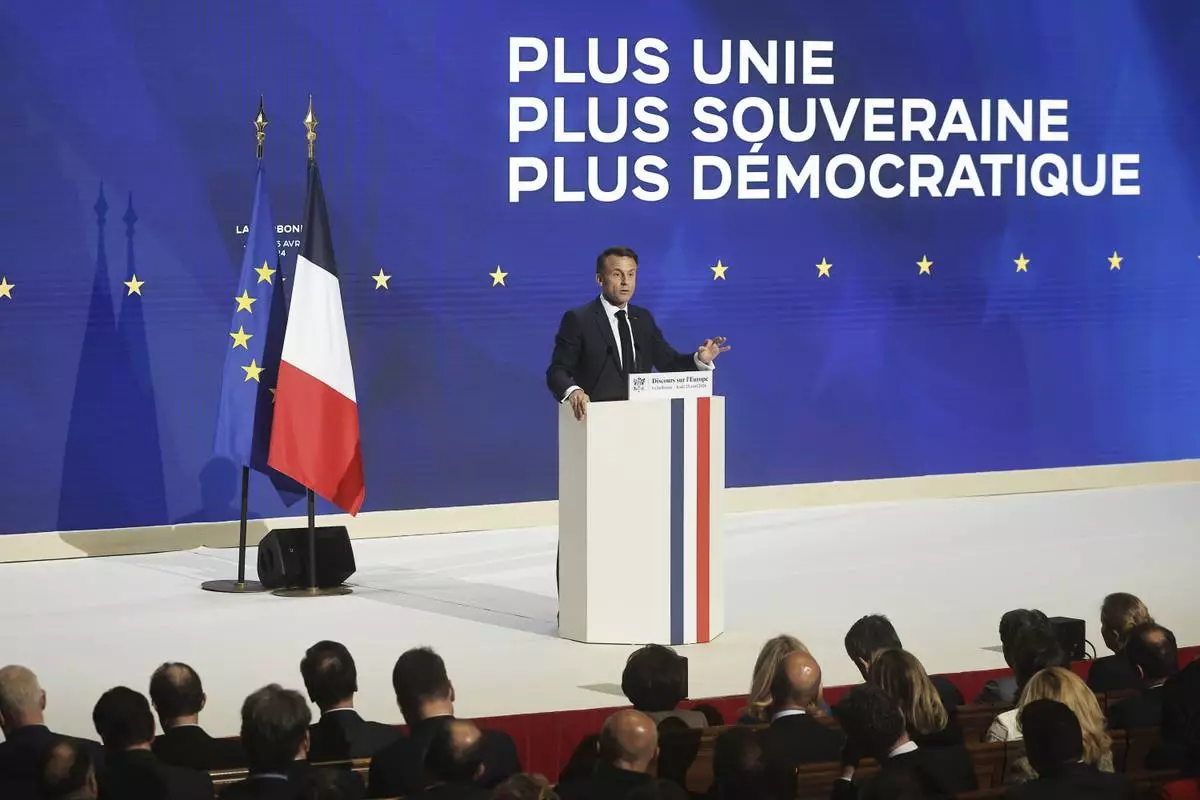
French President Emmanuel Macron delivers a speech on Europe in the amphitheater of the Sorbonne University, Thursday, April 25 in Paris. 2024. French President Emmanuel Macron will outline his vision for Europe as a more assertive global power at the backdrop of war in Ukraine, security, and economic challenges in a speech ahead of pivotal election for the European Parliament in June. (Christophe Petit Tesson, Pool via AP)
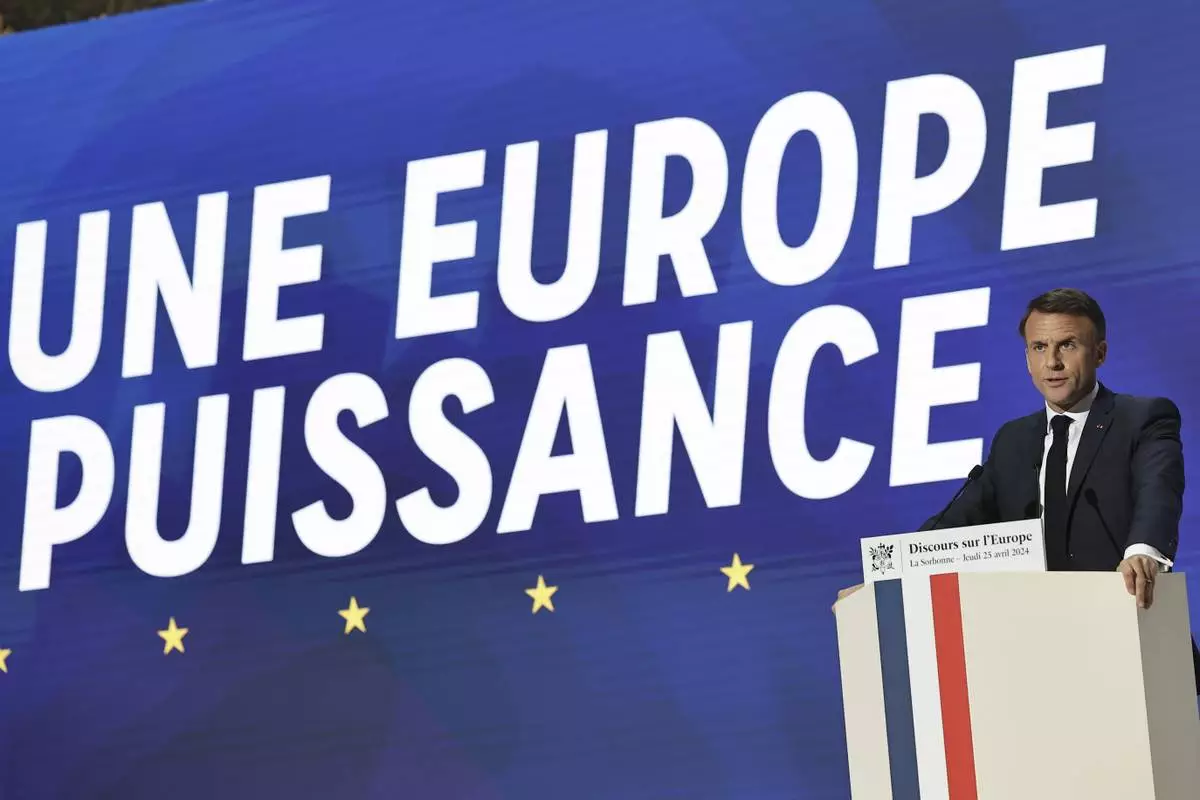
French President Emmanuel Macron delivers a speech on Europe in the amphitheater of the Sorbonne University, Thursday, April 25 in Paris. 2024. French President Emmanuel Macron will outline his vision for Europe as a more assertive global power at the backdrop of war in Ukraine, security, and economic challenges in a speech ahead of pivotal election for the European Parliament in June. (Christophe Petit Tesson, Pool via AP)
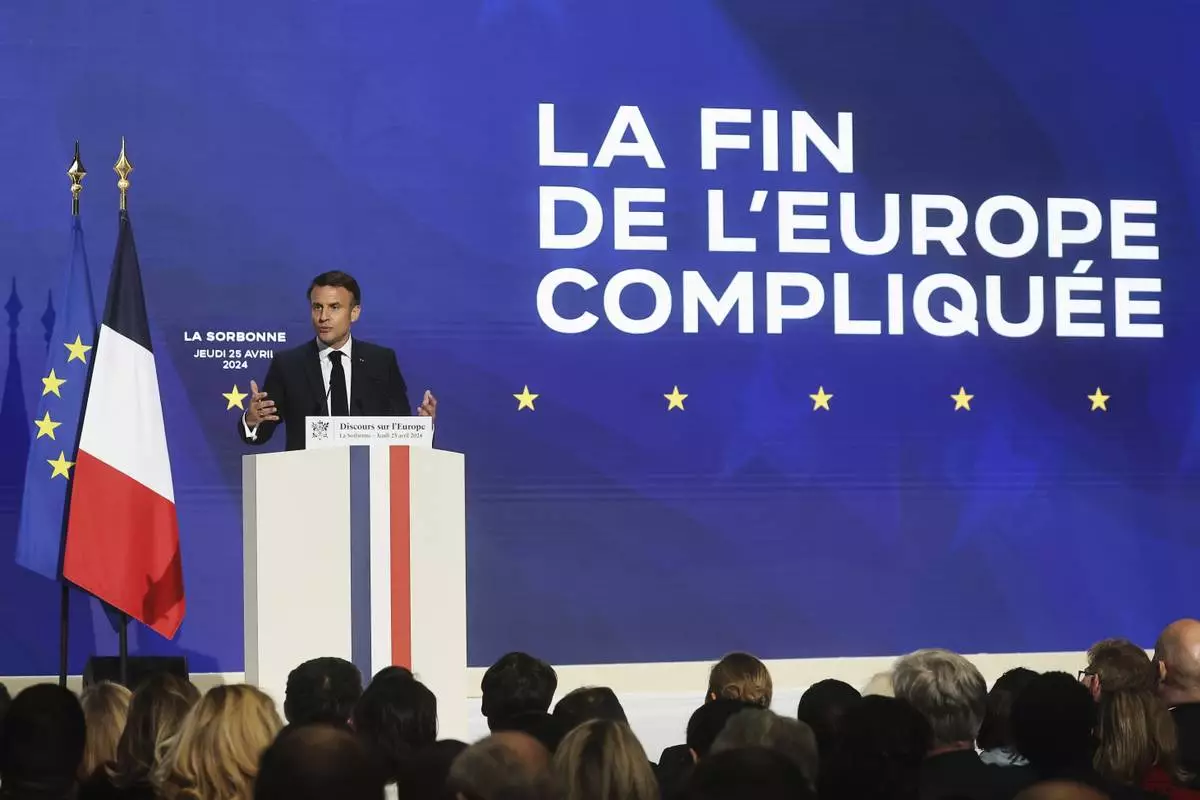
French President Emmanuel Macron delivers a speech on Europe in the amphitheater of the Sorbonne University, Thursday, April 25 in Paris. 2024. French President Emmanuel Macron will outline his vision for Europe as a more assertive global power at the backdrop of war in Ukraine, security, and economic challenges in a speech ahead of pivotal election for the European Parliament in June. (Christophe Petit Tesson, Pool via AP)
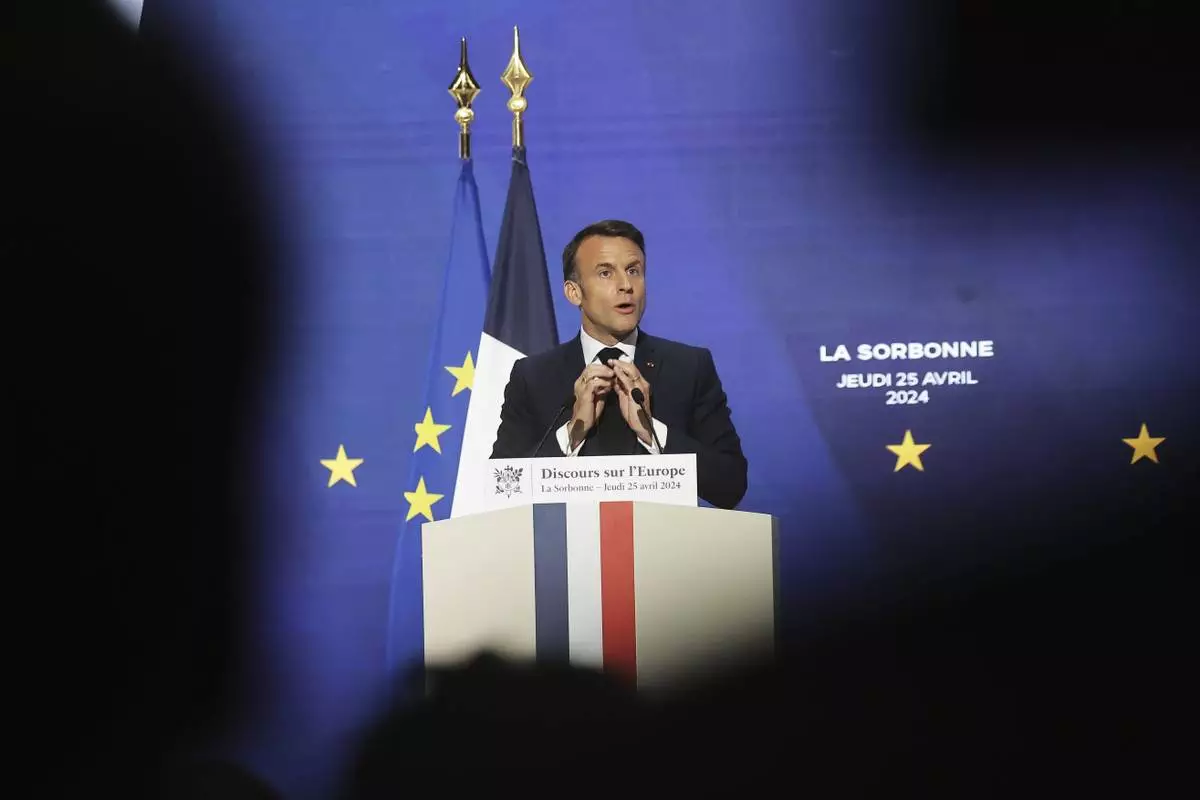
French President Emmanuel Macron delivers a speech on Europe in the amphitheater of the Sorbonne University, Thursday, April 25 in Paris. 2024. French President Emmanuel Macron will outline his vision for Europe as a more assertive global power at the backdrop of war in Ukraine, security, and economic challenges in a speech ahead of pivotal election for the European Parliament in June. (Christophe Petit Tesson, Pool via AP)
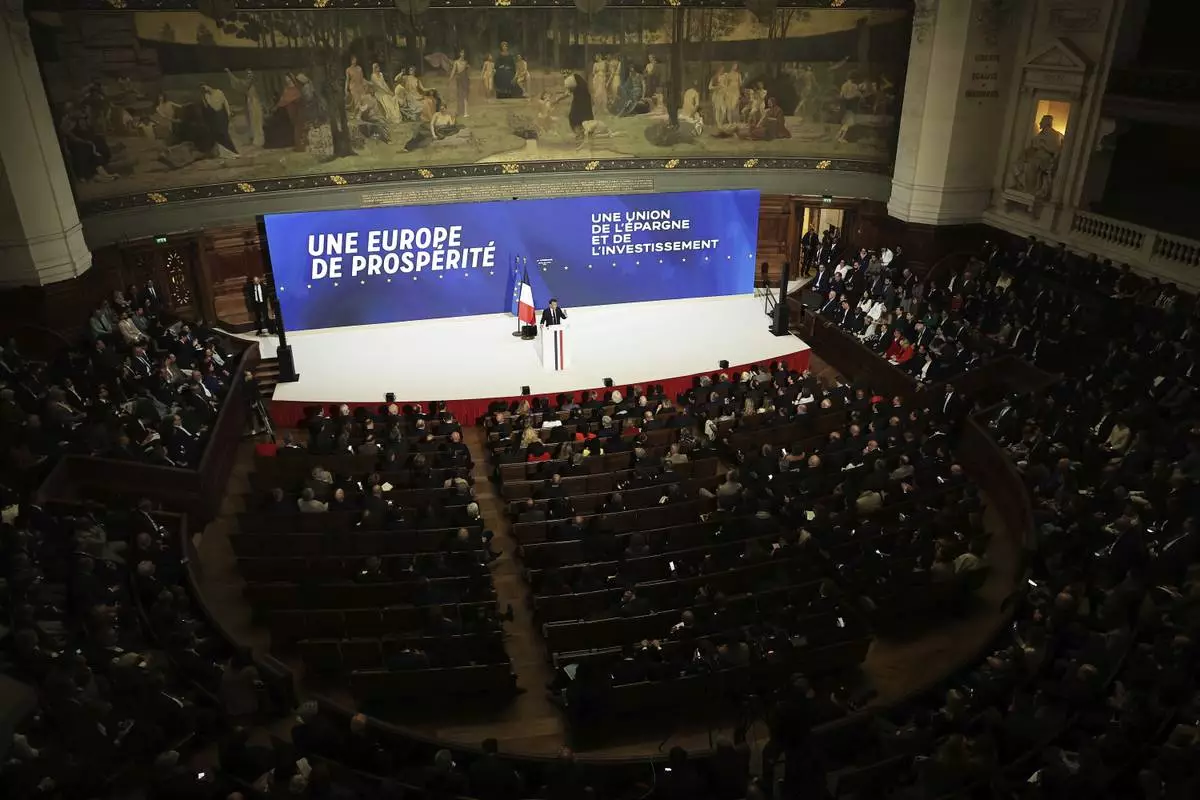
French President Emmanuel Macron delivers a speech on Europe in the amphitheater of the Sorbonne University, Thursday, April 25 in Paris. 2024. French President Emmanuel Macron will outline his vision for Europe as a more assertive global power at the backdrop of war in Ukraine, security, and economic challenges in a speech ahead of pivotal election for the European Parliament in June. (Christophe Petit Tesson, Pool via AP)
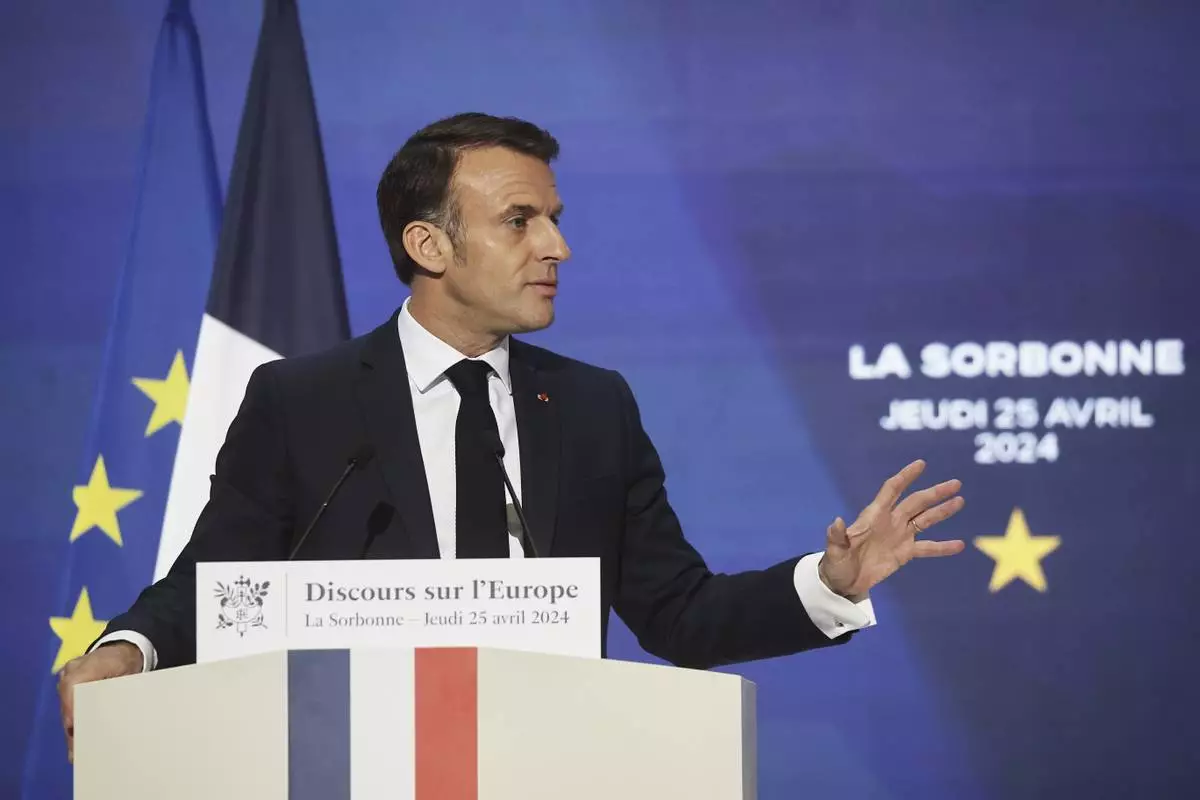
French President Emmanuel Macron delivers a speech on Europe in the amphitheater of the Sorbonne University, Thursday, April 25 in Paris. 2024. French President Emmanuel Macron will outline his vision for Europe as a more assertive global power at the backdrop of war in Ukraine, security, and economic challenges in a speech ahead of pivotal election for the European Parliament in June. (Christophe Petit Tesson, Pool via AP)
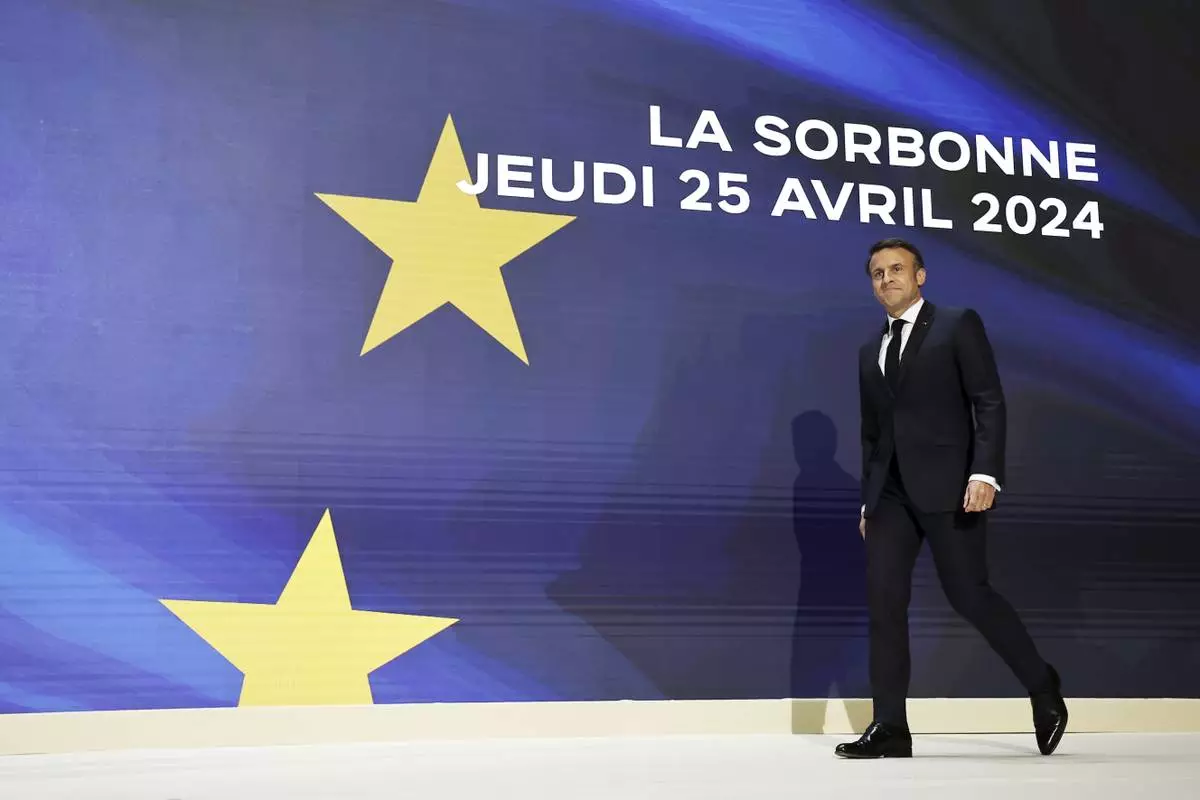
French President Emmanuel Macron arrives to deliver a speech on Europe in the amphitheater of the Sorbonne University, Thursday, April 25 in Paris. 2024. French President Emmanuel Macron will outline his vision for Europe as a more assertive global power at the backdrop of war in Ukraine, security, and economic challenges in a speech ahead of pivotal election for the European Parliament in June. (Christophe Petit Tesson, Pool via AP)
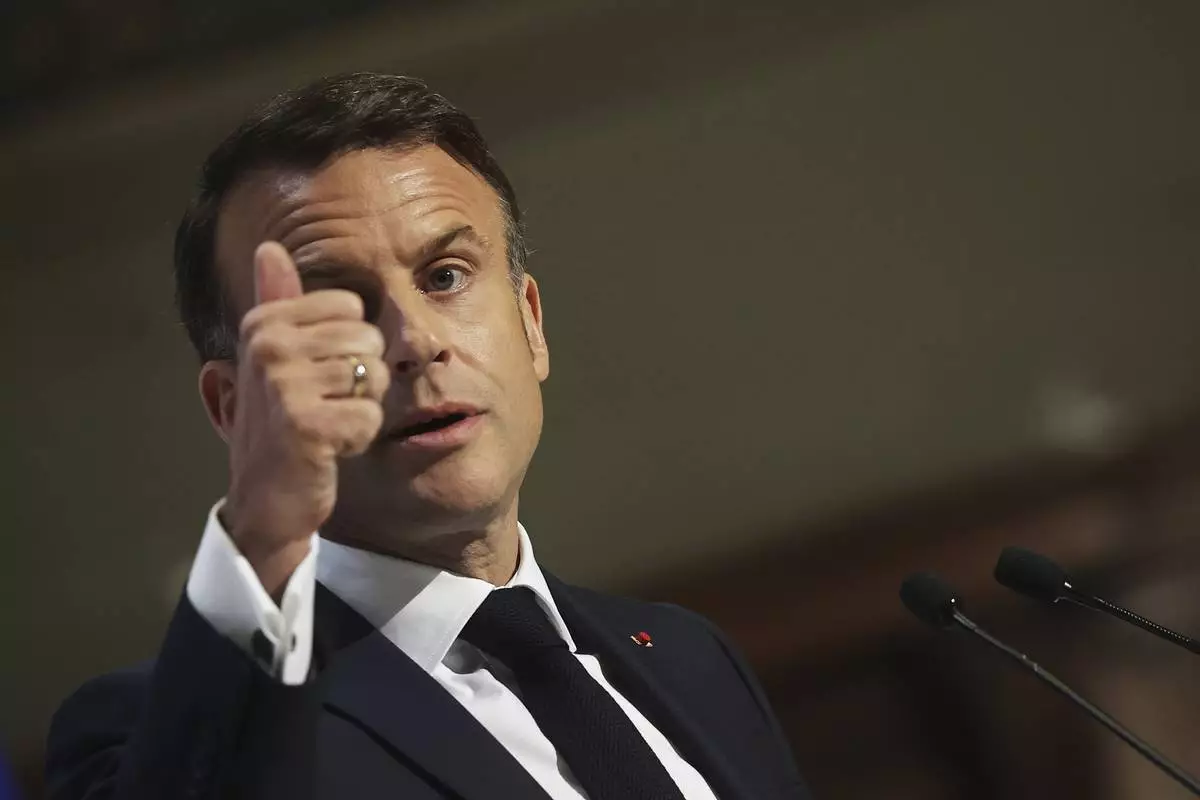
French President Emmanuel Macron delivers a speech on Europe in the amphitheater of the Sorbonne University, Thursday, April 25 in Paris. 2024. French President Emmanuel Macron will outline his vision for Europe as a more assertive global power at the backdrop of war in Ukraine, security, and economic challenges in a speech ahead of pivotal election for the European Parliament in June. (Christophe Petit Tesson, Pool via AP)
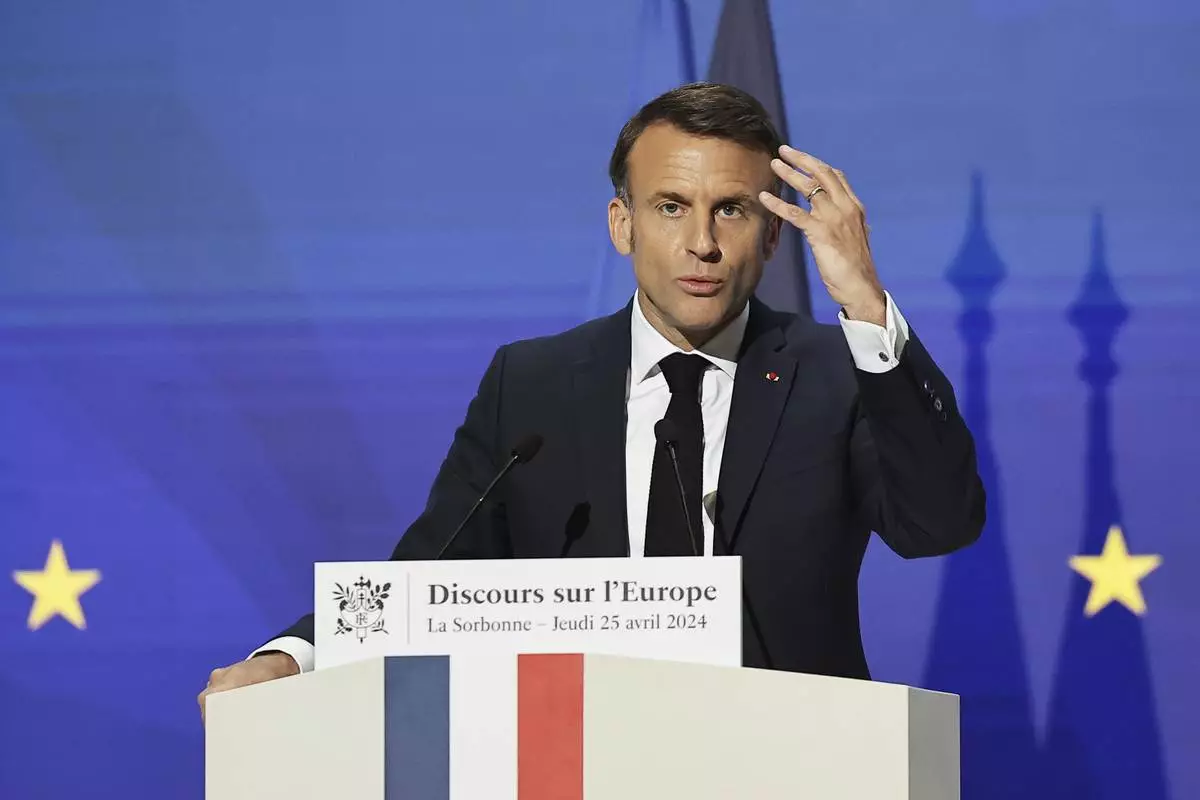
French President Emmanuel Macron delivers a speech on Europe in the amphitheater of the Sorbonne University, Thursday, April 25 in Paris. 2024. French President Emmanuel Macron will outline his vision for Europe as a more assertive global power at the backdrop of war in Ukraine, security, and economic challenges in a speech ahead of pivotal election for the European Parliament in June. (Christophe Petit Tesson, Pool via AP)
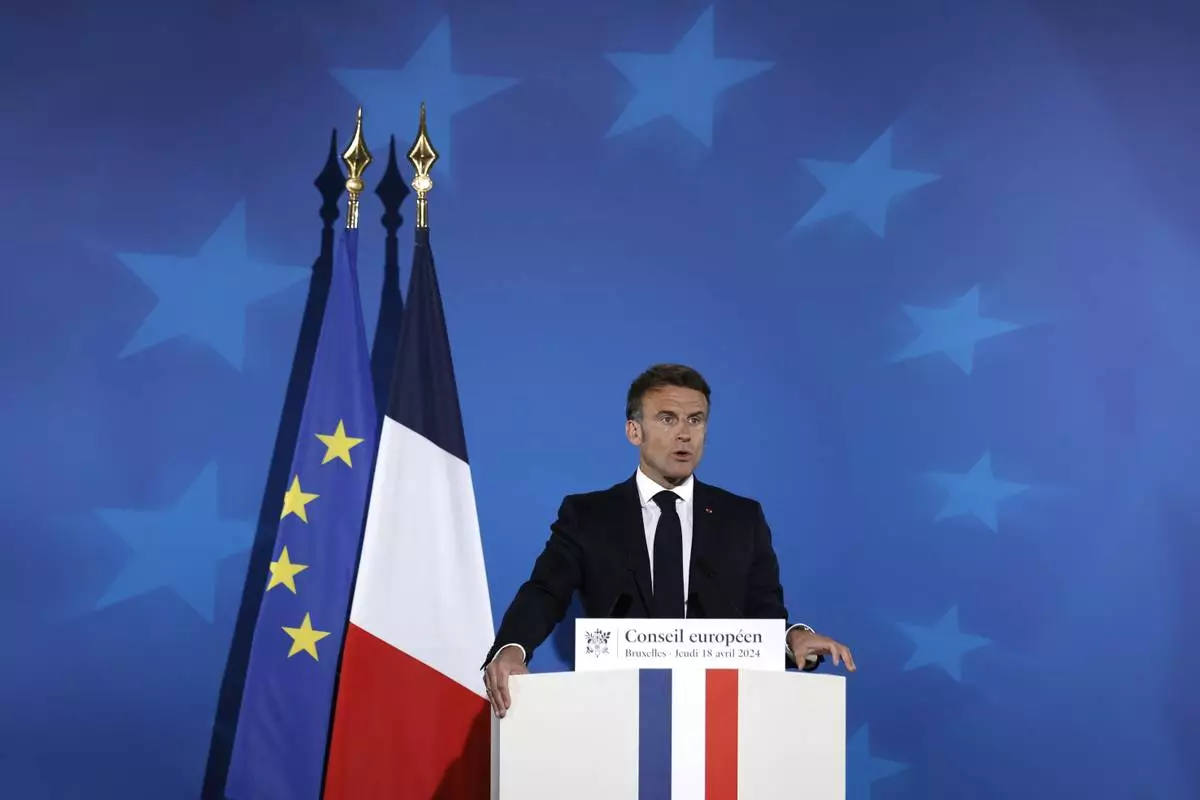
French President Emmanuel Macron speaks during a media conference at an EU summit in Brussels, Thursday, April 18, 2024. European Union leaders on Wednesday debated a new "European Competitiveness Deal" aimed at helping the 27-nation bloc close the gap with Chinese and American rivals amid fears the region's industries will otherwise be left behind for good. (AP Photo/Omar Havana)



















